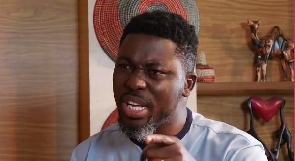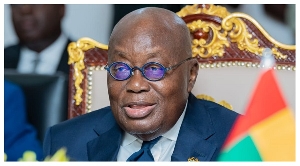- Home - News
- TWI News | TV
- Polls
- Year In Review
- News Archive
- Crime & Punishment
- Politics
- Regional
- Editorial
- Health
- Ghanaians Abroad
- Tabloid
- Africa
- Religion
- Election 2020
- Coronavirus
- News Videos | TV
- Photo Archives
- News Headlines
- Press Release
General News of Sunday, 12 June 2011
Source: Nana Sifa Twum, London
Successful Research Into Improvement In The Preservation Of Cocoa Trees
Story: Nana Sifa Twum, London
Successful Research Into Improvement In The Preservation Of Cocoa Trees By Dr Adu Gyamfi
A Ghanaian PHD Student at Reading University, in the United Kingdom has successfully researched into a very effective way of preserving cocoa plants against fire, drought and some cocoa diseases like the Cacao Swollen Shoot Virus (CSSV).
Dr. Raphael Adu-Gyamfi a Ghana Government-sponsored PhD scholar, who researched on the biotechnological conservation of cocoa germplasm, has expressed the hope that his research will contribute immensely towards the development of the main cash crop of the country.
He researched into conservation of cocoa germplasm by using somatic embryos of cocoa which he generated through a biotechnological technique called somatic embryogenesis earlier employed by Li et al (1998). The cocoa somatic embryos survived cold storage in liquid nitrogen (-196oC) and were weaned into plantlets
Dr. Adu-Gyamfi, a lecturer at the University of Development Studies, Tamale, at a meeting in London with Ghana’s High Commissioner to the UK Professor Kwaku Danso-Boafo to discuss his project, noted the need to conserve biodiversity of cocoa has become paramount due to the action of a range of diseases pests and environmental hazards.
He stated that in 1983 bushfires destroyed 60,000 hectares of cocoa plantation in Ghana and in 1982, 185.5 million trees were cut in the Eastern Region of Ghana alone due to Cacao Swollen Shoot Virus (CSSV) infection. In order to safeguard germplasm of cocoa there is the need to use in vitro based techniques to support ‘insitu’ conservation.
He said cocoa produces recalcitrant seeds that cannot be stored for long so we needed a method that will enable us to store our cocoa germplasm for long. Using somatic embryos ensures that the materials store for future use is clonal or true-to-type to some extent.
He explained that the cocoa preservation is necessary to prevent the destruction of cocoa through bushfires and draught. He said the method will also save space of large acreage of land required for cocoa germplasm conservation.
He told the Ghanaian envoy that funding was being sought by the Reading University, to transfer the technology to the Cocoa Research Institute of Ghana to enable the institute to make the technology available and accessible to the Ghanaian cocoa farmer.
Professor Danso Boafo himself a University Lecturer, congratulated the scholar for his excellent research work. He said matching research work with Ghana’s developmental needs is very crucial for economic growth and appealed to Ghana’s Tertiary Institutions to enhance the research content of the Teaching modules they offer.
He encouraged scholars to focus on areas of research which would directly benefit Ghana’s growing economy, and praised the relentless efforts of many researchers who have provided a good grounding for the future generation.
He expressed the Government of Ghana’s determination and commitment to continue in its efforts to develop its human resource.
Also present at the presentation were Mr. Bawa Ayembilla, Minister/Welfare and Consular Affairs, Mrs. Wilhelmina Asamoah, Minister Counsellor/Education and Mr. Mousa Lemboni, Manager, Cocoa Marketing Company (UK) Ghana Ltd.










